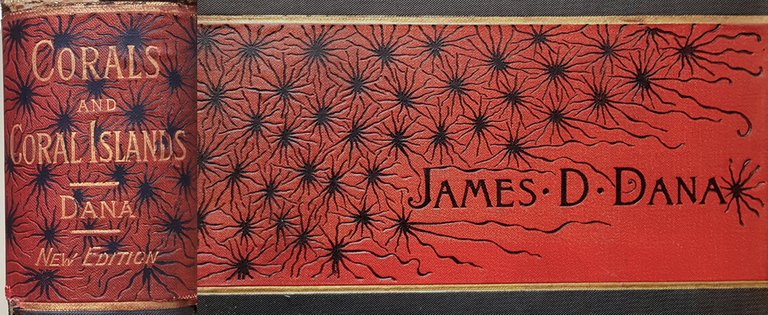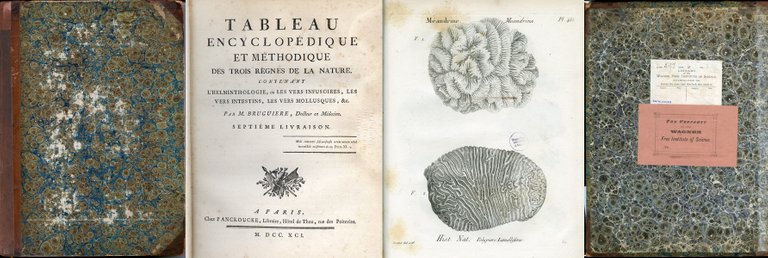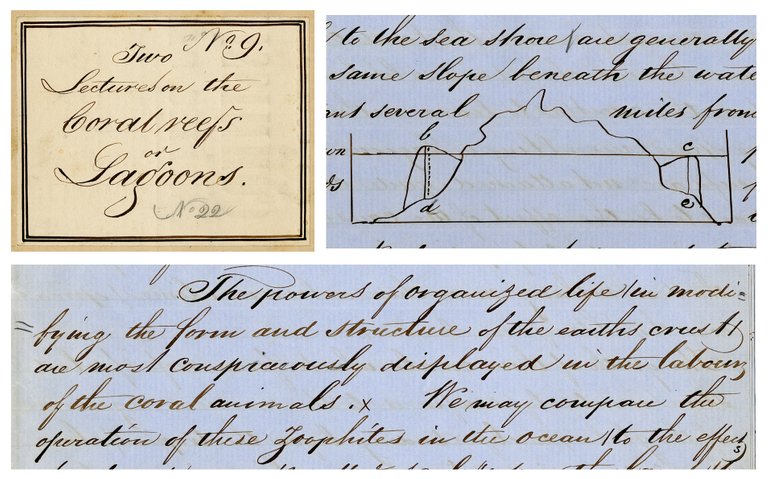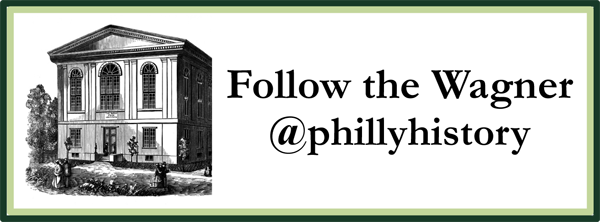Temple University-Wagner Fellow, Jena Osman, found inspiration in a single specimen of brain coral. See our previous post to learn more about this specimen and other corals in our collection. This specimen led her down a long and varied path of research that resulted in the creation of an epic poem titled System of Display, which was published in Bard College’s literary journal Conjunctions. Osman’s poems are written by following associative and serendipitous paths. So what was this path that led her from a single specimen to an epic poem?

- Coral and Coral Islands by James D. Dana. NY : 1890. In the Wagner Library
It all started with a specimen of brain coral from the collection of our founder William Wagner. This immediately presents two paths of research: William Wagner’s history; and corals. Osman’s first question was, had Wagner ever travelled to the places the specimens of coral came from – the Bahamas, the Caribbean, and the South Pacific? In Osman’s research into William Wagner, she learned that in his youth, he worked for the great financier and philanthropist Stephen Girard. She discovered that:
Wagner was deeply impressed by Girard’s philanthropic creation of Girard College, and that his gift inspired Wagner’s desire to create a free educational institution for all who had an interest in science. So I was very interested to learn that when Wagner was 20, he was supercargo on a ship named Helvetius, named after the French Philosopher Claude-Arien Helvetius. In 1758, Helvetius published De L’Esprit (On Mind) where he argued that all people have the same ability to learn and that unequal education is the key to inequality. Wagner’s stint as a supercargo was in 1818, which also, coincidentally, was the year that Philadelphia established its first public schools.

- Papers from the Robert Chambers Collection in the Wagner Archives.
Osman’s research path into corals and coral reefs stretched from
19th century understandings of the organisms and reef formation to 21st century confrontations with coral bleaching and the very real possibility of total reef collapse as the oceans warm.
She consulted current scientific research as well as historic texts from the Wagner’s library.

- Tableau encyclopédie et méthodique des trois règne de la nature. Paris : 1827. In the Wagner's Library
Osman also found in the Wagner’s archives William Wagner’s handwritten lecture on coral reef formation.

- William Wagner's lecture on Coral Reefs in the Wagner's Archives.
Her conclusions?
Free public education and the world’s system of coral reefs, vibrant and sustainable in William Wagner’s time, now seem somewhat precarious.
You can read System of Display by Jena Osman in Conjunctions:69, Fall 2017, pp. 252-265
100% of the SBD rewards from this post will support continuation of fellowship program at the Wagner Free Institute of Science.

From 1758? Fascinating that Osman was able to curate such a powerful window into the past by way of a coral sample!
Yes! It was so interesting to witness all the directions her research took her. And a lot of fun for me to help her. It's too bad I can't share her poem. I was hoping it would be online, but it's not.
Here's a tempting tidbit from the first page of this wonderful poem by Jenna Osman:
I really like "a shelter made from its interior life" and "collecting is the first step toward naming."
So much of the Wagner starts with collecting and naming, but extends to preserving and experiencing. Which is why a visit to the place is so utterly special.
I love the hand writing of this time period. We have many family letters from the mid victorian era and the perfect line of their script is like art in itself, the patience to make it. I don't think they even teach 'cursive' any longer, a dying art. I know that isn't what this post is about, but I couldn't' help but comment on it, as I truly love the old writing style.
That's actually a really important thing to point out! Cursive is not taught much anymore, but yet so much of our history is recorded this way. So much of it that it is impossible to think that it will all be transcribed and/or digitized. So, what happens to this information as fewer and fewer people can understand it? It is interesting to think about ways that archives can serve as classrooms and these papers as teaching tools. I have actually attended transcribathons which function dually as teaching arenas and a means to digitize these papers. They are a lot of fun!